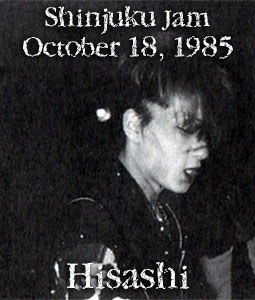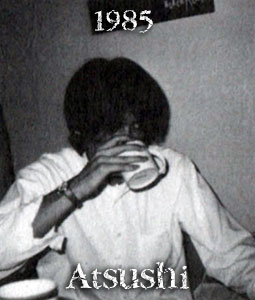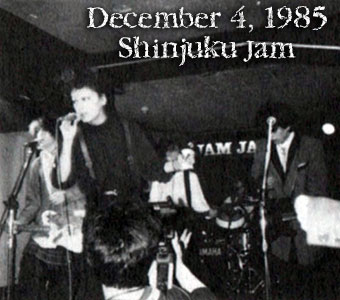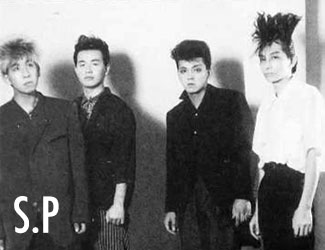1985
In February, Toll's band play at least 2 shows, the 24th at Shibuya Epicurious, apparently representing Takasaki and possibly as the winners of Popcon. Also on the 25th at GTV.
Hide and U-ta finally graduated high school in the spring. Each convinced their parents to let them move to Tokyo to attend school. Atsushi stayed behind and would travel to Tokyo for shows. All of the band members in Tokyo lived in the same area except for U-ta. They would often hang out together to rehearse, listen to music, and just grow as friends. They rehearsed once per week. Atsushi quits his job in August and finally moved to Tokyo in November. By December, he and his friends were sharing an apartment. (It's only after moving to Tokyo that his famous love of cats developed as a roommate had a pet cat.)
Buck-Tick's live debut in Tokyo was on August 4 at Shinjuku Jam. The capacity of the venue is around 200-250. The band was poor as many bands who start out don't have much money. The tickets for the show were handmade. They played at Shibuya Yaneura on August 6 (capacity around 350) and at Maebashi Garcia on August 25. The Maebashi show included Toll's band S.P.
Buck-Tick played at Beat For Beat For Beat Vol. 1 at Shinjuku Jam on November 8. It was Araki's last show with Buck-Tick because a little later after that, Hisashi decided that Araki didn't fit with the image he had of Buck-Tick because Araki couldn't sing the songs. It was very hard for Hisashi to tell this to Araki because they had been friends since grade school, moved to Tokyo together, and were even sharing a room because that's all they could afford to do for living quarters. The members were drinking at a bar when Atsushi brought up the topic. To the band's surprise, Araki said he had felt the same way. As all of this was going on, everyone was very emotional and crying, as drunk people do. Now with Araki out of the picture, the band did not know what to do for a new vocalist.
 [The book Love Me has this photo of Hisashi (right) and notes that it was taken on October 18 at Shinjuku Jam. However, it is never noted in the book that Buck-Tick played a gig that day. The date could be wrong, it could have been a day that they forgot to list in their live history, or it could simply be the date of the photo is correct and no gig was played that day. However, the book does comment that Hisashi began to decorate his face around this time and in the photo, one can see that Hisashi painted across his nose and shaved a bit of his head. If one looks at the video that has surfaced from 1984 though, Hisashi decorating his face did not begin in 1985 but it could be when he started experimenting more with his hair.]
[The book Love Me has this photo of Hisashi (right) and notes that it was taken on October 18 at Shinjuku Jam. However, it is never noted in the book that Buck-Tick played a gig that day. The date could be wrong, it could have been a day that they forgot to list in their live history, or it could simply be the date of the photo is correct and no gig was played that day. However, the book does comment that Hisashi began to decorate his face around this time and in the photo, one can see that Hisashi painted across his nose and shaved a bit of his head. If one looks at the video that has surfaced from 1984 though, Hisashi decorating his face did not begin in 1985 but it could be when he started experimenting more with his hair.]
Atsushi had decided that he would rather sing than play the drums. He did not have a desire to become a professional drummer. In fact, he didn't think he played the drums well at all. He consulted U-ta's older brother Toll since he was a drummer and had been nice enough to let Atsushi practice at his house. Also, Toll's band S.P had just lost their vocalist so Atsushi thought he might be able to join them. Toll told Atsushi that he shouldn't become the vocalist because he is Buck-Tick's drummer and should stay the drummer. He also wouldn't allow Atsushi to join S.P. Furthermore, Toll told Atsushi that S.P had broken up.
 Speaking to Toll had bothered Atsushi a lot since he was determined to sing. It is said that Atsushi told his dilemma to a member of the famous Japanese band Boøwy. This member told him that he should be a vocalist if that is what he wants to do. This convinced Atsushi. Another story goes that when Boøwy was back home in Gunma, they threw a party and Atsushi was there. The singer Kyosuke Himuro told him he has a good face so he should be a singer. Atsushi has later denied that this story is true but in an interview in 2016, this story was clarified. Atsushi stated that he was told by Himuro that he has a good face so he should be a singer but that wasn't the reason he was in band, but rather a reason why he decided he would rather sing than play drums. He told his plans to U-ta. U-ta then called Hisashi in Tokyo. Hisashi didn't like this idea because Atsushi had been the drummer and he didn't know what his voice sounded like. Also, Hisashi had already begun auditions with a tall man he thought fit Buck-Tick's image. Hisashi decided the band should hold a meeting.
Speaking to Toll had bothered Atsushi a lot since he was determined to sing. It is said that Atsushi told his dilemma to a member of the famous Japanese band Boøwy. This member told him that he should be a vocalist if that is what he wants to do. This convinced Atsushi. Another story goes that when Boøwy was back home in Gunma, they threw a party and Atsushi was there. The singer Kyosuke Himuro told him he has a good face so he should be a singer. Atsushi has later denied that this story is true but in an interview in 2016, this story was clarified. Atsushi stated that he was told by Himuro that he has a good face so he should be a singer but that wasn't the reason he was in band, but rather a reason why he decided he would rather sing than play drums. He told his plans to U-ta. U-ta then called Hisashi in Tokyo. Hisashi didn't like this idea because Atsushi had been the drummer and he didn't know what his voice sounded like. Also, Hisashi had already begun auditions with a tall man he thought fit Buck-Tick's image. Hisashi decided the band should hold a meeting.
At the meeting Atsushi made his desire to sing quite clear. He said that no one wanted to sing more than he. Looking back, he has commented that he is not sure why he was so adamant but it's a good thing he was. The band thought if Atsushi were to sing, who would play the drums? U-ta suggested his brother Toll since he was no longer in a band as S.P had broken up in October. The rest of the members knew of Toll's drumming power and thought that there could be no other drummer for Buck-Tick. It was now U-ta's job to convince Toll to join them.
 Toll told U-ta that he had given up on music and would not join the band. He had been playing in bands for awhile and his last band was the number one band in the local scene but couldn't make it big. Just like a typical older brother, Toll said that if he couldn't make it then there was no way U-ta and his friends could. U-ta eventually convinced Toll that becoming the drummer of Buck-Tick was the only thing he could do. Toll agreed to join them in November and moved in with U-ta in Tokyo. Up until then, he had drummed using his real name but adopted the stage name of Toll Yagami for Buck-Tick. Rehearsals were begun immediately. This line-up's live debut was on December 4 at Shinjuku Jam for Beat For Beat For Beat Vol. 2. The set was about 30-40 minutes long and they still have yet to change their line up. They played another show on the 9th at Garcia in Maebashi, Gunma.
Toll told U-ta that he had given up on music and would not join the band. He had been playing in bands for awhile and his last band was the number one band in the local scene but couldn't make it big. Just like a typical older brother, Toll said that if he couldn't make it then there was no way U-ta and his friends could. U-ta eventually convinced Toll that becoming the drummer of Buck-Tick was the only thing he could do. Toll agreed to join them in November and moved in with U-ta in Tokyo. Up until then, he had drummed using his real name but adopted the stage name of Toll Yagami for Buck-Tick. Rehearsals were begun immediately. This line-up's live debut was on December 4 at Shinjuku Jam for Beat For Beat For Beat Vol. 2. The set was about 30-40 minutes long and they still have yet to change their line up. They played another show on the 9th at Garcia in Maebashi, Gunma.
For the few concerts the band played in 1985, I only know the setlist for the two shows in December. By then they had starting playing songs that would be released on both Indie and major labels. These songs later released include songs first released in 1986 (Plastic Syndrome Type II, To-Search), 1987 (Empty Girl, Future For Future, Mis-Cast, Secret Reaction), and even 1988 (Automatic Blue). Although the book Love Me listed that "Future For Future" was originally titled "Future Song" and credits the original title for the December 9 setlist, the audio bootleg of the show reveals that Atsushi introduces it as "Future For Future". The drumming is noticeably improved thanks to Toll. Just compare the performance of "No No Boy" from Atsushi's drumming in 1984 to Toll's drumming in 1985. For the benefit of the doubt, we could argue the quality of the recording plays a part but Toll's drumming even from the intro sounds more like a real drummer.
Toll's history: he began to learn the drums because he and U-ta's older brother had played the drums. Toll's influences are more Western classic rock bands but also Japanese bands like Carol, Auto-Mod, and The Rockers. Toll is 5 years older than U-ta and their older brother was five years older than Toll. Unfortunately the older brother got into a motorcycle accident and never completely recovered, though his injuries were not apparent at the time. They lived off a major street and he was struck right in front of the home at a time when there were no helmet safety laws. Since he had not broken any bones, the doctors thought he was fine and so the brother recovered at home. He complained of headaches and the doctors still thought was just fine. The headaches prevented him from functioning and so he basically just stayed at home and didn't work. After 2 years of headaches, he died in his sleep in May 1977. Toll was interested in music thanks to his older siblings and tried to practice on a cheap SG type of guitar but memorizing chords was boring for Toll, so he decided he would continue his brother's drumming. It's a sad story, but if this had never happened, there probably would have never been a Buck-Tick like there is today. (This older brother tragedy is so significant to Toll's life that his 2004 solo project Yagami Toll & the Blue Sky is heavily about it and the album is even called 1977/Blue Sky. The live shows are heavy with covers, including Carol songs.)
After Toll's brother died, his father wanted to put the brothers things away, including the drums. Toll decided to take up drumming. Toll's first band was in 1977 and it was called called Shout. They were a copy of the Japanese band Carol. Toll became more serious about drumming the following year when he started high school. He quit after three months and focused on the band. Meanwhile, the other band members continued their education so that when high school graduation came, the band broke up. Toll was 18 with no education and no band. He set off to do manual labor and play drums on Sunday, joining various rock and party bands. This led him to joining the Rocking Dynamites and they played '50s rock 'n' roll. By the time he was 20, Toll started participating in local amateur band contests and networked with a lot of the musicians. This is how he formed a lifelong friendship with Makoto Takahashi who had recently joined Boøwy.
 Around 1983, Toll was asked to join a band called Spots. (S.P with Toll pictured at the far right.) He thought he would help out for a little bit and that would be it. However, he stuck around as other members changed and the name of the band changed. Spots stood for Sex Pistols On Tour Secretly and the band took this for their name because the Sex Pistols toured using this acronym of the S.P.O.T.S in 1977. At first Spots played covers of The Rockers. Soon after the band named changed to S.P System. As they became more serious, they started writing their own songs and once the lineup settled they had shorted the name to S.P. Photo here is taken from the East West '85 record and the members at the time were Hiroaki Koido on voculs, Norifumi Sekine on guitar, Hiroyuki Koike on bass, and Toll was using his real name as he had not yet adopted the stage name he uses in Buck-Tick.
Around 1983, Toll was asked to join a band called Spots. (S.P with Toll pictured at the far right.) He thought he would help out for a little bit and that would be it. However, he stuck around as other members changed and the name of the band changed. Spots stood for Sex Pistols On Tour Secretly and the band took this for their name because the Sex Pistols toured using this acronym of the S.P.O.T.S in 1977. At first Spots played covers of The Rockers. Soon after the band named changed to S.P System. As they became more serious, they started writing their own songs and once the lineup settled they had shorted the name to S.P. Photo here is taken from the East West '85 record and the members at the time were Hiroaki Koido on voculs, Norifumi Sekine on guitar, Hiroyuki Koike on bass, and Toll was using his real name as he had not yet adopted the stage name he uses in Buck-Tick.
During those days, Toll had a mohawk and S.P would sometimes paint their faces white, influenced by the likes of Auto-Mod and Bauhaus. S.P played many local amateur festivals such as Popcon and East West. In fact, S.P is on the double live record East West '85 along with an amateur Lä-Ppisch, who also later became a famous band in the late '80s. Lä-Ppisch would go on to sign to the same major label as Buck-Tick did (Victor Entertainment, Inc.), made their major debut on the same date, and toured together once. I remember both bands also endorsed JVC stereos. In fact, on this flyer from 1985, one can see that S.P and Lä-Ppisch both played on August 24, 1985 for Yamaha's East West contest. The band's trajectory seemed good and Toll thought he was finally going to go pro. Their vocalist did not share the same desire and is the reason he left, the band broke up, and left Toll open to another opportunity to help out a band in need of a drummer.
 From the few photos that have been published from this period, it appears that Hisashi acquired and painted a Fender Telecaster, which would become his main guitar. In these very early days of the band, it appears that Hisashi, Hide, and U-ta went through a few instruments until they settled upon their main one. It was common for all three of them to custom paint their instruments.
From the few photos that have been published from this period, it appears that Hisashi acquired and painted a Fender Telecaster, which would become his main guitar. In these very early days of the band, it appears that Hisashi, Hide, and U-ta went through a few instruments until they settled upon their main one. It was common for all three of them to custom paint their instruments.
I'm not sure exactly when each of their staff and management team started to help the band, but it should be noted here that in the early days, Buck-Tick used their friends as staff members. A former classmate of Hide and U-ta named Hitoshi Ojima has been a roadie, road manager, and other sort of manager for the band for several years. (Ojima was last credited in 1994 in a Buck-Tick release but he has been thanked in Hisashi's side project Lucy.) The same basic backstory is true for Shigeo Azami, although he continues to work with the band as Toll's drum tuner. He wasn't friends with Buck-Tick members in high school, though they did go to school together. They became friends after he attended a concert in the early days and recognized his former peers. Buck-Tick didn't have a manager back then but U-ta was very friendly and knew a lot of people so he basically acted like their manager. Photos of Hitoshi show up sometimes in early fan club issues, magazine appearances, even in Buck-Tick books. Shigeo's photo and interview is in the Guitar Archives book but but he also appears in some in early resources such as fan club newsletters. Buck-Tick's manager in the late '80s also makes an appearance in the Hyper book but I'm not sure if managers since then have been photographed. Their current manager (since 2000) is active on social media to promote the band. Before the band had a proper stylist, Atsushi's friends would help make his stage costumes. As for other roles, such as costume, make-up, sound engineers, and so forth, many people that the band currently work with began working with the band since around the early 1990s.